Accreditation, Quality Management and Rankings
EBS Universität für Wirtschaft und Recht is the oldest private business university in Germany. Its graduates occupy top positions all over the world.

In the pursuit of excellence in teaching and research, accreditations and rankings play an important role – they complement the internal instruments of our quality management. The quality of our study programmes and the institution as a whole is regularly reviewed and confirmed by independent national and international institutions.
Our accreditations
EBS Universität and its study programmes are regularly evaluated and accredited by national and international accreditation agencies focusing on the offered subject areas.
By clicking on the logo of the institutions, you will get further information.


AACSB
AACSB (Association to Advance Collegiate Schools of Business) is a global not-for-profit organisation that brings together educators, students and businesses to achieve a common goal: to educate the next generation of leaders. Since 1916, AACSB has stood for the highest standards of quality, providing quality assurance, business education information, and learning and development services worldwide.


Wissenschaftsrat
In 2022, EBS Universität was reaccredited by the Wissenschaftsrat, the German Council of Science and Humanities, for the next 5 years.
This academic seal of quality is awarded to non-governmental universities whose performance in teaching and research meets recognised scientific standards. The Wissenschaftsrat is one of Germany’s most critical science policy advisory bodies and advises the federal and state governments on developing universities, science and research. In the multi-stage accreditation procedure, which includes the submission of a self-report by the university and a visit to the university by an external group of experts over several days, the university is evaluated in eight key areas. These include its academic quality in research and teaching, its structures and equipment, and its quality assurance and development.


Akkreditierungsrat
All study programmes at EBS Universität are accredited by the German Accreditation Council and are reviewed regularly in cooperation with the accreditation agency FIBAA.
The superordinate Foundation Akkreditierungsrat is an association of the German federal states aiming for quality assurance in learning and teaching at German universities. Since 2018, following the conversion of the German accreditation process, the Akkreditierungsrat has focused on the decision of accreditations. These are based on reviews of the accreditation agencies on programme accreditations as well as system accreditations. Thus, the Akkreditierungsrat plays an essential role in the final evaluation of the respective study programme. The Accreditation Council only accepts expert reports from accreditation agencies that have the EQAR registration of the Accreditation Council. The degree programmes at EBS Universität have been assessed by FIBAA, which is notably recognised in business and economics.
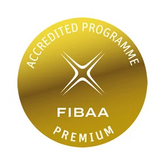

FIBAA
FIBAA is a nationally and internationally experienced agency for quality assurance, which was founded on the initiative of business associations and sees the promotion of employability and practical relevance as its trademark. In Germany, it carries out assessments in accordance with the State Treaty on the Accreditation of Studies and the legal ordinances of the Länder, which are a prerequisite for the accreditation of study programs by the Accreditation Council. According to this procedure, all study programs at EBS University were subjected to an assessment by FIBAA.
FIBAA awards the Premium Seal to study programmes that have demonstrated excellent quality in study and teaching in the course of a FIBAA accreditation procedure. This special distinction provides prospective students, students, graduates, universities and the job market with reliable information about the outstanding quality of the study program. At EBS University, the law program was awarded the premium seal.
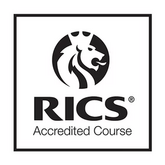

RICS
The Royal Institution of Chartered Surveyors (RICS) accredited the Master in Real Estate (MSc) programme of EBS Business School since 2013.
The accreditation process is extensive and takes place every five years. In addition, annual monitoring takes place. The real estate industry recognises RICS as an international professional association of real estate professionals. RICS is committed to international standardisation. Its main tasks are to regulate and promote the profession, maintain high standards of education and professional practice, protect clients and consumers by adhering to a strict code of conduct and provide advice, analysis and guidance. Around 400 programmes are accredited by RICS worldwide.


Financial Planning Standards Board
The Financial Planning Standards Board Deutschland e.V. (FPSB Germany) accredited the certificate programmes Financial Economics (Level I and Level II) and Generation Management and Estate Planning (Level I and Level II) offered by EBS Executive School. The continuing education programmes prepare students for the corresponding certifications.
The Financial Planning Standards Board Deutschland e.V. mission is to provide certification for advisors to private clients according to international standards on training, independent examinations, proof of experience, and ethics. The FPSB Germany is part of the global FPSB Network, bringing together 27 countries worldwide that have certified more than 190,000 people in financial planning. In the FPSB Network – and thus also through FPSB Germany – individuals are licensed as Certified Financial Planner Professionals and European Financial Advisor EFA.
Quality Management at EBS Universität
Consistent quality orientation is a requirement for national and international accreditations and for maintaining the status of a research-active and internationally recognized university. Quality is a vague concept, and the production must be realized through transparent rules, planning and practical measures according to a defined quality model. In the end, the success of students and graduates will be the most critical evidence of quality. Therefore, their success (or failure) are the most important KPIs of the quality management system.
In academia, faculty development plays a crucial role in quality management by enforcing high standards for selecting faculty members and creating tools for scientific, pedagogical, and personal growth. Research-active lecturers can present and discuss the current state of knowledge in class. Quality management supports the faculties and their members in documenting and maintaining their academic competence base, setting incentives for individual development and balancing teaching obligations and research expectations.
Quality management contributes data for the individual development of faculty members, used for the annual leadership and development talks with the Dean. It allows the assessment of the performance in the previous period and operates as a basis for the target agreement in the following year. In addition to the intrinsic research motivation of faculty members, incentives are set in monetary bonuses or research funds or through a temporary reduction in teaching loads.
As a critical element of quality management, programme development ensures that the programmes meet national regulations and international higher education standards. They are designed and periodically reviewed through systematic processes to achieve learning objectives relevant to students and their future career or academic prospects. Following a competence-based approach, EBS Business School has introduced “Assurance of Learning” (AoL) to monitor learning outcomes.
Likewise, EBS Law School follows a competence-based approach that includes the module descriptions’ intended learning outcomes. We ensure the orientation of the annual review of the programme quality towards the overarching competence goal of preparing for the First Law Examination and is based, among other things, on the grade statistics and results from the course evaluations.
During the annual Continuous Improvement Talks, the Academic Directors and Programme Managers analyze and discuss together with participating faculty members the data collected by the Quality Management department and identify areas for improvement concerned. At the meetings, we develop packages of measures to improve the learning outcomes of the programmes. Based on the AoL results, deficits could be made visible and initiate modifications in the curriculum or learning processes.
With the Major Programme Review, a fundamental process for the medium-term redesign of the programmes complements the continuous improvement process. We evaluate each programme in a comprehensive analysis that includes key stakeholders and students every five to eight years. This process precedes any programme re-accreditation.
The most fundamental core process of a university is the development of each student along the entire life cycle. In this process, quality management integrates academic, administrative and service functions from student application and selection, organisation of learning, actual teaching and learning activities, student assessment to career services. At each stage of the process, quality measurements track student performance and the effectiveness of teaching, learning and individual support, which are essential KPIs for quality management. Teaching and research remain closely linked at a research-oriented university like EBS. The approach of research-based learning forces students to explore new and exciting problems.
The administration is not only part of the Quality Management system of EBS by providing critical supporting processes: On the one hand, administrative departments such as Human Resources and Accounting contribute to efficient operations, transparent guidelines and target-oriented management and support so that the faculty members can concentrate on their learning, teaching and research duties. On the other hand, administrative departments such as the Faculty Administration, the central Student Services, and the Career Services Center focus on providing a high standard of service to our students. In addition, Campus and Facility Management, IT and our Learning and Transformation Center contribute as significant resources to high quality at EBS. Internal and external evaluations regularly include the university’s services and infrastructure in their scope of observation.
The quality of services and infrastructure is regularly evaluated by students on an annual basis using a Satisfaction Monitor. In addition, we perform event-related surveys on learning conditions and infrastructure, e.g., learning effectiveness and technical infrastructure in online and hybrid teaching formats during the Covid-19 pandemic.
Our awards in renowned rankings
EBS Universität regularly occupies top positions in the relevant rankings and therefore receives visible recognition for its excellence in research and teaching.
By clicking on the logo of the institutions, you will get further information.
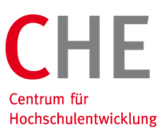

CHE Hochschulranking
The CHE Hochschulranking is the most comprehensive and detailed ranking of German universities. It includes data about studies, teaching, equipment and research, and students’ assessments of the learning conditions at their university in the ranking. The annual DIE ZEIT study guide publishes the results. For some subjects, the ranking also considers the reputation of the departments among professors. In addition to the comparative criteria, prospective students can choose from a wide range of descriptive features on study and teaching. EBS Universität is represented in the subject areas of Business Administration and Law and has consistently achieved excellent results over the past years.
In the current CHE Ranking 2023/2024, EBS Universität is again represented in the upper field of the top group in the majority of categories in both subject areas and was able to further expand its position. In particular, the Bachelor in Business Studies at EBS is the only university to receive 5 stars in the overarching category "General study situation" and in the category "Support from teaching staff", putting it in first place in Germany. The law programme at EBS also achieved top positions in the current ranking. It achieved second place in Germany in the categories "Support from teaching staff" and "Support during studies". The Master's programmes Master in Management, Master in Real Estate and Master in Finance, as well as the full-time MBA at EBS also achieved above-average ratings in the current ranking. Particularly noteworthy are the results in the categories "Support from teaching staff", "Practical relevance of teaching" and "Study organisation".


WirtschaftsWoche
The WirtschaftsWoche ranking is published by the economic magazine WirtschaftsWoche every year and is based on a survey carried out by Universum. Universum is an internationally recognised Employer-Branding specialist. The magazine asks HR managers from German companies which university graduates they consider remarkably competent in their activities for the survey. EBS Universität für Wirtschaft und Recht is part of this ranking every year in Business Administration and Law. Overall, EBS Universität has achieved excellent results in recent years.
In the latest 2024 ranking of WirtschaftsWoche, EBS is among the top 10 German universities in Business Administration.


Financial Times Ranking – European Business School
The Financial Times Ranking is the most important business school ranking for university providers in education and training. The ranking is based on the results of several sub-rankings, including the FT Master in Management Ranking and the FT Executive Education Ranking. It analyses the excellence of Europe's top business schools and highlights their strengths in terms of graduate salary progression, faculty diversity and programme quality. International accreditation by EQUIS or AACSB is a prerequisite for inclusion in the Financial Times ranking. The rankings underline the first-class programme quality and the high level of satisfaction of EBS graduates.
Current award 2024:
- European Business School: 50th place in Europe // 5th place in Germany


Financial Times Ranking – Masters in Finance
The Financial Times Ranking confirms the Master in Finance programmes’ excellence in equipping students with the knowledge and skills necessary for a successful career in the financial industry. It evaluates several significant criteria such as employment rates and salaries after graduation, highlighting our commitment to ensuring successful career outcomes for our graduates. Additionally, the ranking considers diversity criteria, like gender diversity, and extends to encompass international diversity among our students and faculty. With a proportion of 37% female students, EBS is ahead of the other German universities in the ranking.
Particularly noteworthy in the current ranking is the high overall satisfaction (9.25/10) and the high hiring rate (98% within 3 months) of our graduates.
Current award 2024:
- Master in Finance: 31th place worldwide // 2nd place in Germany


Financial Times Ranking – Masters in Management
The Financial Times Ranking confirms the Master in Management programmes’ excellence in equipping students with the knowledge and skills necessary for a successful management career. It evaluates several significant criteria such as employment rates and salaries after graduation, highlighting our commitment to ensuring successful career outcomes for our graduates. Additionally, the ranking considers diversity criteria, like gender diversity, and extends to encompass international diversity among our students and faculty.
Current award 2024:
- Master in Management: 42th place worldwide // 6th place in Germany


Financial Times Ranking – Executive Education
The Financial Times Executive Education Ranking is the most important business school ranking for university providers of executive education. The Financial Times Ranking is a confirmation of the excellence of EBS Executive School's programmes in the continuing education of participants with relevant professional experience. To be included in the Ranking, a school must be accredited by AACSB or Equis and have an annual turnover of at least USD 1 million with open or customised executive education programmes. The ranking evaluates several important criteria such as the programme design, the quality of teaching and the relevance of the skills acquired. EBS scored particularly well in terms of graduate satisfaction, emphasising its commitment to enabling participants to build a successful career through further education. In addition, the ranking takes into account diversity criteria such as gender diversity and also includes international diversity among participants and lecturers.
Current award 2024:
- Open executive education programmes: 48th place worldwide // 3rd place in Germany
- Customised executive education programmes: 73rd place worldwide // 4th place in Germany


QS World University Rankings
The QS World University Ranking has been examining the development of universities and colleges worldwide for almost 20 years and provides an overview of their qualifications. This year's ranking includes 1,500 universities in 104 countries. The results are based on the analysis of 17.5 million academic publications and the expert opinions of more than 240,000 university teachers and employers.
In this year's QS ranking, the Master's in Management and the Master's in Finance are once again ranked in a good position. Both Master’s programmes have performed excellent in various categories of the ranking and stand out in particular in the area of “Alumni Outcome”. This reflects the fact that students at EBS not only receive a first-class education, but are also provided with the skills and knowledge they need for successful professional development and making an impact.
Current award 2025:
- Master in Finance: 74th place worldwide // 3nd place in Germany
- Master in Management: 58th place worldwide // 5th place in Germany


U-Multirank
U-Multirank is an international and independent initiative initiated by the European Commission to evaluate colleges and universities. With the evaluation of more than 1,700 universities from over 90 countries, U-Multirank is one of the most comprehensive and detailed evaluation programmes for universities worldwide. In Germany, U-Multirank carries out the study in cooperation with the CHE Hochschulranking. The U-Multirank represents a classification of the participating universities into five performance profiles. These profiles are 1. teaching and learning, 2. research, 3. knowledge transfer, 4. international orientation and 5. regional engagement.
In 2022, EBS Universität ranks in business and law studies among the top 3 universities in Germany.


Universum CareerTest
Universum is the best-known market research institute for employer branding. In annual analyses, it also collects data on student satisfaction , value attitudes and university recognition. The certificates attest to how happy EBS Universität is with the services we offer in general and the support we provide for the best possible employability. Out of 2500+ Universities only 170 received one or more certificates, based on student satisfaction, employment support and brand reputation surveys.
EBS Universität was awarded in 2023, as in previous years, in the following categories:
- Ourtstanding Employability: Presented in recognition of the extraordinary commitment EBS has demonstrated to its students in focusing on providing opportunities and resources to support student employability.
- Outstanding Institutional Offering: Presented in recognition of the extraordinary commitment EBS has demonstrated to its students in providing high quality institutional offerings and resources.


CEO Magazine Ranking
The CEO Magazine Ranking is published annually by an online magazine of the same name. The focus of the ranking is on international MBA and Executive MBA programmes. Within the scope of the ranking, 11 different criteria are surveyed and weighted differently. The most important criterion is the quality of the faculty.
Latest rankings in 2025:
- Full-time MBA: Global Top Tier One
- Executive MBA: Rank 43 global


Eduniversal Masters Ranking
The annual Eduniversal Master Ranking focuses on the quality of each Master and MBA programme included in the ranking. It considers data provided by the school, the score achieved by the level of Palme of Excellence and the reputation amongst recruiters. Furthermore, the ranking takes the satisfaction of students currently enrolled in the respective programme into account. EBS Business School is represented with its Master and MBA programmes in the latest 2022 ranking.
Latest rankings in the 2022/2023 ranking:
- Master in Real Estate: Rank 1 in Germany
- Master's in Finance: Rank 1 in Germany
- Master in Management: Rank 5 in Germany
- Full-time MBA: Rank 2 in Germany
- Executive MBA: Rank 3 in Germany


Manager Magazin
The “Top University in the field of auditing” is awarded by Manager Magazin in cooperation with Wissenschaftliche Gesellschaft für Management und Beratung mbH (WGMB). The WGMB is a scientific research institute with a focus on application-oriented management research. Within the context of the study, the magazine asked a selection of around 50 auditing companies and their clients about their assessment of German universities focusing on auditing. The evaluation of the survey participants is processed in the form of a point ranking and published annually.
EBS is among the top 5 universities in ranking 2024/2025.
Our partnerships
EBS Universität is a member of global accreditation organizations, professional associations and initiatives that promote quality in research and teaching. Within those networks, the exchange between the individual universities and leading educational institutions on best practices and networking is facilitated. In addition, EBS is entitled to undertake industry-specific certifications due to its membership in professional associations.
By clicking on the logos of the institutes, you will get further information.


AACSB Member
EBS Business School is an educational member of the Association to Advance Collegiate Schools of Business (AACSB) Business Education Alliance, which is with 900 members the world’s largest network of business schools and organizations focused on the advancement of business education. Within the network, the members from different areas of education, research, and practice can exchange best practices at various events. In addition, the partnership is a prerequisite in gaining AACSB accreditation.
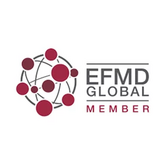

EFMD Member
EBS Business School is a member of the European Foundation for Management Development (EFMD), a global, non-profit, membership-driven organisation to improve management development, which has 966 institutional members in over 90 countries worldwide. As an accreditation body, it is entitled to grant accreditations to business schools, business school programmes and corporate universities. The accreditations also include the EQUIS accreditation for business schools. The corresponding network for schools and companies focuses on the development of socially responsible leaders and managers and offers the exchange of best practices and benchmarking in management education and professional development.


Law Schools Global League Member
The Law Schools Global League (LSGL) is a conglomerate of currently 31 leading law schools across the globe. They seek to stimulate academic debate and cooperation in both education and research concerning the globalisation of law. The LSGL serves as a platform for sharing knowledge and aspires to contribute to the discussion on the globalisation of law and its implications on legal education, research and practice.
Every year, the League organises several activities, including conferences and a summer school centred on law and globalisation, besides setting up joint research and joint-teaching activities.


GMAC Member
EBS Business School is a member of the Graduate Management Admission Council (GMAC). The GMAC is an association of leading graduate business schools, a global organisation focusing on advancing admissions procedures. GMAC is responsible for developing and administering the GMAT exam, a standardised test to measure the suitability for postgraduate Master’s programmes at business faculties. GMAT is mainly used in the selection process for MBA studies. To be invited to the GMAC network, the school needs to follow the GMAC principles containing the support of the GMAC mission, providing quality graduate management education, the fair and ethical treatment of candidates and students, and the contribution to the graduate management education community.


PRME (Principles for Responsible Management Education)
The Principles for Responsible Management Education was founded in 2007 as the academic section of the UN Global Compact. The vision of PRME was and still is to create a global movement and take the lead in responsible management education. The aim is to transform management education and train tomorrow’s responsible decision-makers to drive sustainable development. As a voluntary initiative with over 800 signatories worldwide, PRME has become the most powerful organised platform between the United Nations and management-related higher education institutions. To raise the profile of sustainability in academic education, around 40 higher education institutions, including EBS Business School, are committed to equipping their students with the understanding and skills needed to address challenges in areas such as climate change, poverty reduction and sustainable development. Since 2008, EBS Business School has regularly reported on its progress in implementing the Principles for Responsible Management Education in so-called Sharing Information on Progress (SIP) reports and is involved in the German chapter of the PRME association.
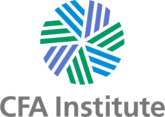

CFA Institute
EBS Business School is a member of the Chartered Financial Analyst (CFA) Institute. The CFA Institute’s purpose is to add value to professionals in investment management and collaborate with the investment management industry to promote ethics, market integrity, and professional standards of practice, thus adding value to society. The CFA is a non-profit organisation and awards the title of Chartered Financial Analyst (CFA) and publishes the Financial Analysts Journal. The requirement for receiving the internationally respected title in investment management is that the candidate has passed three examinations and has at least four years of professional experience in the field of application. The association has more than 110,000 members worldwide, of which almost 90 % are CFA degree holders. Currently, 138 associations exist in 60 countries.


CIS Member
EBS Business School is a member of the Council of International Schools (CIS), which commits itself to high-quality education at primary, secondary schools and higher education institutions. EBS Business School benefits from the connection between member schools and member universities as part of the network. All strive to create a good learning environment for pupils and students to become academically prepared and globally-minded. More than 1,360 institutions from 123 countries, 740 are schools and 610 are colleges and universities are part of the association.


Bologna Hub (Preis zur Anerkennung)
In 2017, EBS Law School received the “bologna hub – Award for Recognition” from the DAAD for particularly innovative approaches and exemplary models for promoting mobility. Degree programmes with a focus on education, medicine and law were considered as part of the competition. The award aims to promote the internationalisation of the degree mentioned above in programmes to gain international experience and expand intercultural competencies.
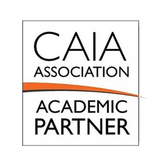

CAIA Association
EBS Business School is part of the Chartered Alternative Investment Analyst Association (CAIA). CAIA focuses on improving investment and societal outcomes of capital allocation through professional education, transparency, and leadership. These goals are evident in the area of alternative investment products. Like CFA, CAIA offers a certificate for professionals. This certificate is on alternative investments, which is achieved through two examinations. CAIA has over 10,000 members worldwide.
German Academic Exchange Service
The German Academic Exchange Service (in German: Deutscher Akademischer Austauschdienst - DAAD) is a joint institution of German universities and student bodies for the cultivation of their international relations, founded in 1925. According to its own information, the DAAD is the world's largest funding organization for the international exchange of students and scientists. Since its founding in 1925, the DAAD has supported more than 2.8 million academics at home and abroad (as of 2021).
We are looking forward to your enquiry





